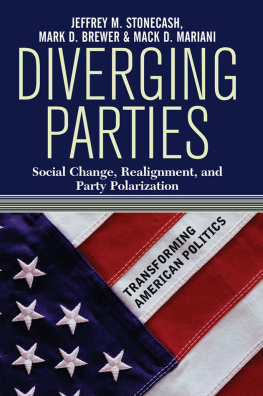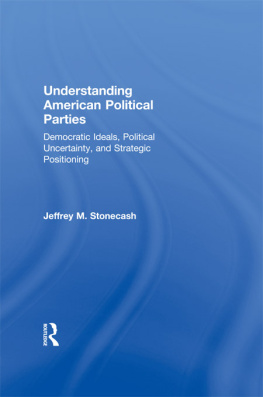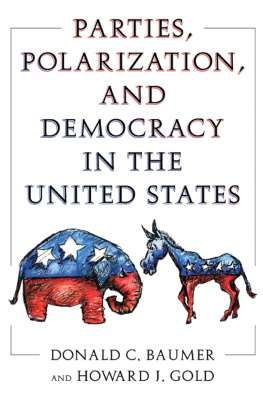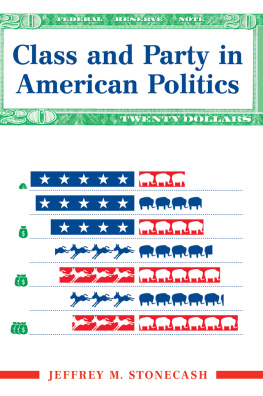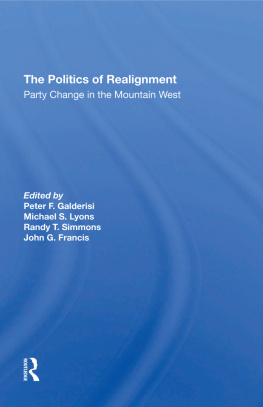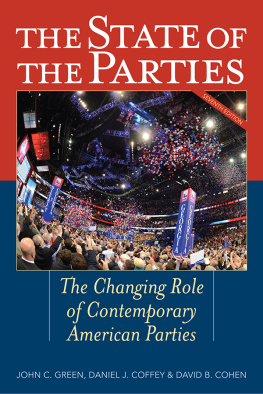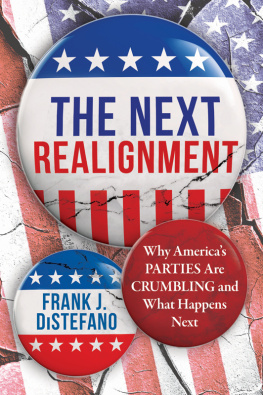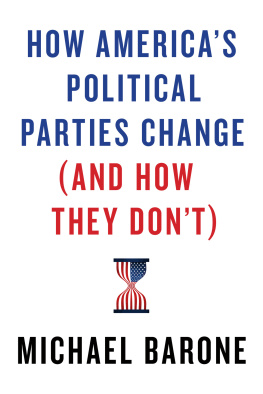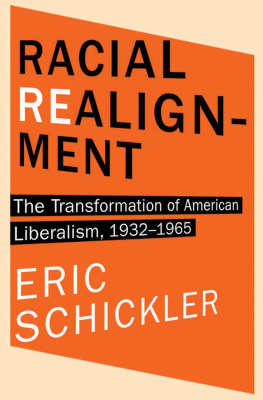Jeff Stonecash - Diverging Parties: Social Change, Realignment, and Party Polarization
Here you can read online Jeff Stonecash - Diverging Parties: Social Change, Realignment, and Party Polarization full text of the book (entire story) in english for free. Download pdf and epub, get meaning, cover and reviews about this ebook. year: 2002, publisher: Westview Press, genre: Politics. Description of the work, (preface) as well as reviews are available. Best literature library LitArk.com created for fans of good reading and offers a wide selection of genres:
Romance novel
Science fiction
Adventure
Detective
Science
History
Home and family
Prose
Art
Politics
Computer
Non-fiction
Religion
Business
Children
Humor
Choose a favorite category and find really read worthwhile books. Enjoy immersion in the world of imagination, feel the emotions of the characters or learn something new for yourself, make an fascinating discovery.
- Book:Diverging Parties: Social Change, Realignment, and Party Polarization
- Author:
- Publisher:Westview Press
- Genre:
- Year:2002
- Rating:3 / 5
- Favourites:Add to favourites
- Your mark:
- 60
- 1
- 2
- 3
- 4
- 5
Diverging Parties: Social Change, Realignment, and Party Polarization: summary, description and annotation
We offer to read an annotation, description, summary or preface (depends on what the author of the book "Diverging Parties: Social Change, Realignment, and Party Polarization" wrote himself). If you haven't found the necessary information about the book — write in the comments, we will try to find it.
Jeff Stonecash: author's other books
Who wrote Diverging Parties: Social Change, Realignment, and Party Polarization? Find out the surname, the name of the author of the book and a list of all author's works by series.
Diverging Parties: Social Change, Realignment, and Party Polarization — read online for free the complete book (whole text) full work
Below is the text of the book, divided by pages. System saving the place of the last page read, allows you to conveniently read the book "Diverging Parties: Social Change, Realignment, and Party Polarization" online for free, without having to search again every time where you left off. Put a bookmark, and you can go to the page where you finished reading at any time.
Font size:
Interval:
Bookmark:
SOCIAL CHANGE, REALIGNMENT, AND PARTY POLARIZATION
Department of Political Science, Maxwell School, Syracuse University
Department of Government, Colby College
Department of Political Science, Maxwell School, Syracuse University

711 Third Avenue, New York, NY 10017, USA
2 Park Square, Milton Park, Abingdon, Oxon OX14 4RN
Product or corporate names may be trademarks or registered trademarks, and are used only for identification and explanation without intent to infringe.
Stonecash, Jeffrey M.
Diverging parties: social change, realignment, and party polarization/by Jeffrey M. Stonecash, Mark D. Brewer, and Mack D. Mariani.
p. cm. (Transforming American politics)
Includes bibliographical references and index.
ISBN 0-8133-4028-4 (hardcover: alk. Paper) ISBN 0-8133-9843-6 (pbk: alk. Paper)
1. United States. Congress. House. 2. Polarization (Social sciences) 3. LegislatorsUnited States. 4. Political partiesUnited States. 5. Representative government and representationUnited States. 6. United StatesPolitics and Government1989-7. United StatesPolitics and government1945-1989. I. Brewer, Mark D. II. Mariani, Mack D. III. Title. IV. Series.
JK1319. S76 2002
328.73'0769dc21
CIP
- ii
- iii
Font size:
Interval:
Bookmark:
Similar books «Diverging Parties: Social Change, Realignment, and Party Polarization»
Look at similar books to Diverging Parties: Social Change, Realignment, and Party Polarization. We have selected literature similar in name and meaning in the hope of providing readers with more options to find new, interesting, not yet read works.
Discussion, reviews of the book Diverging Parties: Social Change, Realignment, and Party Polarization and just readers' own opinions. Leave your comments, write what you think about the work, its meaning or the main characters. Specify what exactly you liked and what you didn't like, and why you think so.

